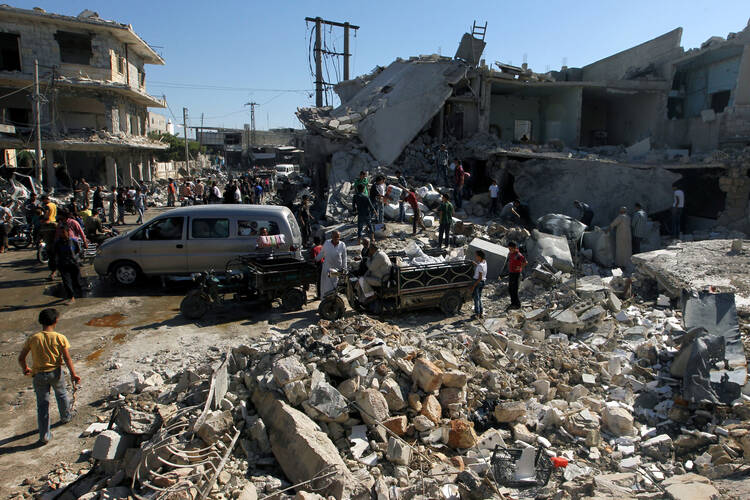Only a small number of civilians in Aleppo are using humanitarian corridors to flee weeks of intensive bombardment; activists say people do not trust that the routes are safe.
Sonia Khush, who directs Save the Children Syria, told Catholic News Service that civilians trapped inside the city's eastern neighborhoods have experienced bombing that has destroyed homes and hospitals, leaving children crippled and dead.
She recounted a story from a staffer at a partner agency at the scene of an airstrike, where children were buried beneath the rubble.
"A child less than 10 years old ran to me shouting, 'Sir, please put my arm back.' His left arm was amputated and he held it with his right hand. He was begging me to put it back, and this is only one of so many tragedies that we see," the aid worker said.
"He described life in East Aleppo like living on the edge of an active volcano," Khush told CNS in the Jordanian capital. "You never know when you are going to die. It just keeps getting harder and harder and more dangerous and more dangerous."
About 200,000 to 300,000 people are believed to be in East Aleppo. No food, humanitarian assistance, or medical aid have been able to reach the rebel-held territory for several weeks due to the intense military onslaught and siege. Syrian government troops are aided by Russian air power and Iranian-controlled militias.
Syrian rebels launched an offensive at the end of July in a bid to break the government's siege of East Aleppo. The U.N.'s special envoy to Syria, Staffan de Mistura, recently warned that basic supplies in East Aleppo could run out in three weeks.
Khush told CNS that, in the last week of July, six health facilities were bombed in the city.
"With the bombing, small field hospitals meant to support five or six critical patients at a time now receive 40 or 50 patients. Imagine the scene of people being treated in the doorways, on the floors, and the enormous stress that the health care providers are under," Khush said. "It's a very difficult situation for them."
"The world cannot turn its back while children are bombed and then denied medical treatment," Khush told CNS. "They are running out of supplies to be able to do things like surgeries that are needed. It's a very critical situation."
Save the Children estimates that Syrian children make up 35 percent of the casualties in Aleppo. It has called for a permanent cease-fire to be put into place.
In early July, the Aleppo office of the Catholic international aid group, Caritas, was hit by a grenade, killing one, injuring passersby and causing extensive damage.
"It is particularly tragic that the person killed was a patient of the Caritas medical project," Stefan Maier, Middle East coordinator of Caritas Austria, said after his recent visit. Elsewhere cease-fires are maintained, but not in Aleppo, Maier told the Austrian Kathpress news agency.
"Pickup trucks constantly drive past the Caritas office, and the loading surfaces in the back are packed with the injured or dead, most of them children," Maier said.
Western Aleppo is also experiencing its own bombing. Franciscan Father Ibrahim Sabbagh told the Catholic charity Aid to the Church in Need that "250 rockets fell on the inhabitants of western Aleppo" the last week of July. The area is under the control of government troops.
Aleppo once boasted one of the most ancient and largest Christian communities in the Middle East, but it is believed that up to 100,000 or some two-thirds of the Christians have fled during the more than 5-year-old war.
Father Sabbagh called the crisis in Aleppo "going beyond that which can be endured." Five Franciscan clergymen help to distribute what little they have to the starving community, he said. a
"We cannot remain passive in the face of this evil," he said. "This is why we are helping where we can by visiting the sick and praying with the faithful."
Pope Francis has often addressed the crisis engulfing Syria. At World Youth Day in Krakow, Poland, the pope prayed for the "sufferings of all the victims of war and for the many families of beloved Syria and other parts of our world."
He spoke after Rand Mittri, a 26-year-old Syrian from Aleppo, told the pope and pilgrims that her city has been destroyed, and "the meaning of our lives has been cancelled. We are the forgotten."
Mittri works in Aleppo at a Salesian center, which daily receives more than 700 young men and women who "come hoping to see a smile," and seeking something lacking in their lives—she called it "humanitarian treatment."
Sister Annie Demerjian, an Armenian Catholic member of the Sisters of Jesus and Mary, works with those in need in Aleppo. She sees firsthand the struggles and challenges of the faithful.
"It is painful to see people without food and water. In them, Jesus is hungry and thirsty. What gives me joy is when I can help them and see the relief and happiness on their faces," she said.
A Caritas employee in Aleppo, identified only as Joseph, summed up the feeling of most Syrians at this time: "We need from the whole world to stand up with us to stop this war. We want to live in peace."








